Alongside the emphasis on intra-Party supervision, another key message delivered by the Sixth Plenum is the further consolidation of the Party’s central leadership under Xi Jinping. “To maintain Party leadership is first and foremost to maintain the Party Central Committee’s centralized, unified leadership,” reads the communique released after the meeting’s conclusion.
While stressing the supreme position of Xi’s leadership has consistently been a major focus of the Party since Xi assumed power, it was the first time Xi was officially styled as the “core” of the Party’s leadership, as the communique calls on Party members to “closely unite around the Party’s Central Committee with Xi Jinping as the core.”
Western analysts have long compared Xi to Mao Zedong, warning that Xi’s power, if left unchallenged, may lead to strongman style “one-man rule.”
Most Chinese analysts, however, have a different perspective, with many comparing Xi Jinping to Deng Xiaoping, the architect of China’s Reform and Opening-up policy that began in 1979. Although the term “core” is also retrospectively used to refer to Mao Zedong, the term itself was first used during the leadership of Deng, who was officially dubbed the core of China’s “second generation” of leadership (with Mao being the first-generation core), and was credited with pushing forward China’s reforms against the persistent resistance put up by conservative officials.
With Xi having laid out ambitious reform plans, many Chinese analysts argue that a strong leader at the top is a necessity for implementing these reform plans. Facing various challenges at home and abroad, including an economic slowdown and increasing tension between China’s regional rivals, Xi’s reform plans range from restructuring the economy, overhauling the legal system to establish rule of law under the Party and reforming the military, to building a modern Party and reinforcing the Party’s ruling status by eradicating corruption.
Zhou Shuzhen, a political science professor at Renmin University, for example, argued that without supreme power, Xi would be incapable of tackling the corruption within China’s military or launching ambitious military reforms which include overhauling and reshuffling the military’s command structure.
“Corruption within the military had long been an open secret, but no one dared to address it as it had been a political taboo,” Zhou told NewsChina. “It took great power and great courage to do so.” Dozens of senior generals, including Guo Boxiong and Xu Caihou, both vice-chairmen of the Central Military Command, were investigated or sentenced for corruption-related crimes.
“To carry out the reform plan he has laid out, Xi needs to consolidate his support base and establish a strong authority within the Party,” Zhuang Deshui, a political scientist at Peking University, told NewsChina. Zhuang stressed that without a strong authority and enough political capital, there is no way the leadership can overcome various interest groups and political factions inside and outside the party to carry out these reforms.
“The idea is that Party cadres are required to support the policies and decisions made by the leadership core, rather than idolize the core personally,” said Zhuang, also pointing out that the communique issued by the plenum had explicitly warned against “flattery” and “sweet-talking,” and urged Party members to “stick to the facts.”
What’s Next?
With a consolidated central leadership and the establishment of an intra-Party supervision framework, it is expected that the Party will expand its institutionalization efforts beyond Party agencies to cover government structure overall.
The newly released regulation on intra-Party supervision states that “Party commissions will work alongside the National People’s Congress, the government, supervisory agencies and law enforcement agencies” to conduct supervision of public agencies and public servants.
According to professor Ma Huaide, vice-president of China University of Political Science and Law and an adviser to the State Council, the document’s juxtaposition of “supervisory agencies” with the National People’s Congress and the government, the first time in a Party document, suggests that the leadership will escalate the standing of supervisory agencies. China’s current Ministry of Supervision, which falls under the State Council, China’s cabinet, has only limited power, according to Ma.
“In the future, we may see the establishment of a super-supervisory agency, that is independent from the State Council, the NPC and other branches of the government,” Ma added.

 Old Version
Old Version

